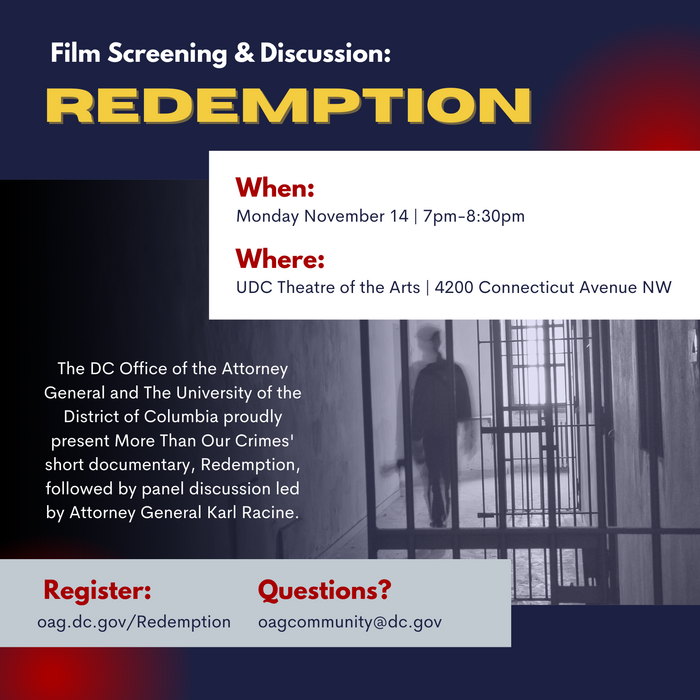I believe in redemption personally and politically; it is the basis of my religious belief.
Sen. Dick Durbin, at the first oversight hearing for the new director of the federal Bureau of Prisons, Colette Peters
I recently read a book titled, “A Happy Pocket Full of Money” by David Cameron Gikandi. In it, he writes, “Everything happens now. You remember your past now. You dream of your future now. You learn from your past now. When you were in your past, it was still now. At that point in the past, if someone were to ask what you were doing now, it would still be now. You work toward your future now. You get to your future now. You are always here, now. There is nothing you can do in any moment except now.”
His words struck a chord. Like an epiphany, it occurred to me that who a person is, what a person does or is capable of doing, all is determined now, in the moment.
So why is it that when it comes time for the powers in charge to decide whether or not a person is reformed and rehabilitated and ready to leave prison, they place so much emphasis on who the person was in the past?
More than 1 in 4 imprisoned people from D.C., for example, have already served at least 15 years. (A whopping 96% of them are Black men.) And their sentences will keep them there for perhaps another 15 or more, despite the fact that they are very different people today than they were when they committed or were accused of a crime.
As Nazgol Ghandnoosh of the Sentencing Project shared in The Washington Post, many judges consider individuals who have educated and trained themselves like Gene Downing to be a “rare success.” But as Downing said, during his 21 years in prison he encountered many others who seized opportunities for growth and have become outstanding candidates for release. “People like me may not be the majority,” he said, “but there are more like me there. I’m not one of a kind.”
They thought they buried us.
But really, they were only planting seeds.
From fertile concrete we blossomed
into solid oak trees,
instead of old, withered weeds.
If allowed to be free once again,
we’re mentors, entrepreneurs,
community activists,
violence interrupters.
In the end,
we turned out to be ‘towering’ men.
Redemption.
Here’s an honor roll of my own:
Anthony Petty…James Carpenter…Michael Plummer…Shannon Battle…Roy Middleton…Leonard Daye…Halim Flowers…Kareem McCraney…Momolu Stewart…Luther Fuller…Loneldon Windsor…Joel Caston…Jeremiah Mungo…Michael Woody.
Those 14 guys all committed serious crimes as children and, cumulatively, they served over 300 years in prison. They used that time to change. They grew spiritually. They matured morally. They learned academically. They became better men and today are free, working as community activists, violence interrupters, authors, public speakers, entrepreneurs. They are all living their “now,” and I can’t wait to join them :-).

At the BOP oversight hearing, Sen. Durbin quoted this statistic: Between March 2020 and July 2022, the BOP released 11,043 people to home confinement under the pandemic-era CARES Act, and only 17 returned to prison for engaging in new criminal conduct. “It is clear that many of the people languishing in federal prisons have paid their debt and do not need to be there,” he said. “They should be developing vocational skills and receiving mental health counseling and educational services, so they can re-enter society.” I vehemently agree with him.
We can and should be a country of second chances, not just for people who committed nonviolent crimes like drug possession, but for everyone. I have lived in the bowels of federal penitentiaries for over a quarter century, and until DC adopted its Incarceration Reduction Amendment Act (IRAA), I spent much of my days doing what we call “bidding”—doing whatever I could to make the time tolerable, although not necessarily productive. For me, that was mostly anything to do with sports. For others, it could be much more harmful activities, like consuming homemade wine or drugs. “I like how it feels,” says one. “It takes me away from here.”
I have a 30-years-to-life sentence. Some of my comrades have life without parole. If you have nothing better to look forward to, you don’t have any reason to believe that what you with your “now” can lead to a better now later. A now when we can go into our back yard and throw a football with our son. When we can savor the simple joy of sitting on the couch and watching a movie with our mother or wife. When we can jump in a cool swimming pool on a hot summer day. When we can share our son’s birthday with him as he opens presents. When we can watch the sunrise without a guard tower looming overhead.
IRAA changed that for men and women like me from D.C. who were convicted under District code. We now knew that our “now” could some day be different. My friend James Carpenter once told me, “Bruh, it feels good as hell to just walk into a store, open up the freezer and grab a Welches grape soda, or anything else you want for that matter….” It’s a now he revels in and will never jeopardize. As he told me tonight, “Y’all eating bologna sandwiches every night for dinner. I ain’t never coming back.”
Here’s what we can all do
We need to offer everyone an opportunity for a better now. The D.C. Council just unanimously passed a revised criminal code that allows anyone who has been incarcerated at least 20 years the opportunity to petition for release and testify about his or her readiness. (IRAA and its later update limited this chance for freedom to those who were younger than 25 at the time they committed their crime.) The mayor should sign it and Congress must allow it go into effect (since the District has not been given statehood yet, Congress is given veto authority). Do you live in D.C.? Write to Mayor Muriel Bowser (eom@dc.gov), who has spoken out against the revised code, and tell her to sign it!
And when Sen. Cory Booker’s Second Look Act is re-introduced next month at the federal level, we must all push for that, despite the challenge of a possibly Republican-controlled Congress. Everyone deserves to know that tomorrow’s now could be different. Tell your senators to sign on/vote for it!




